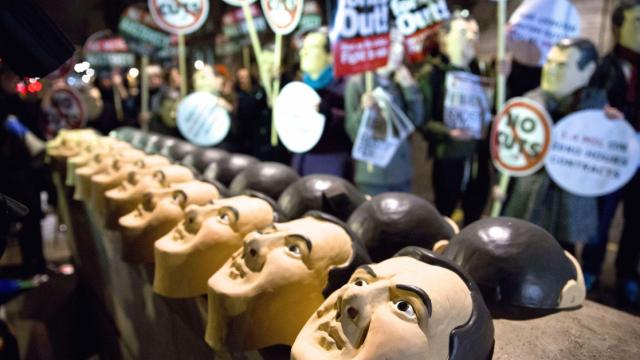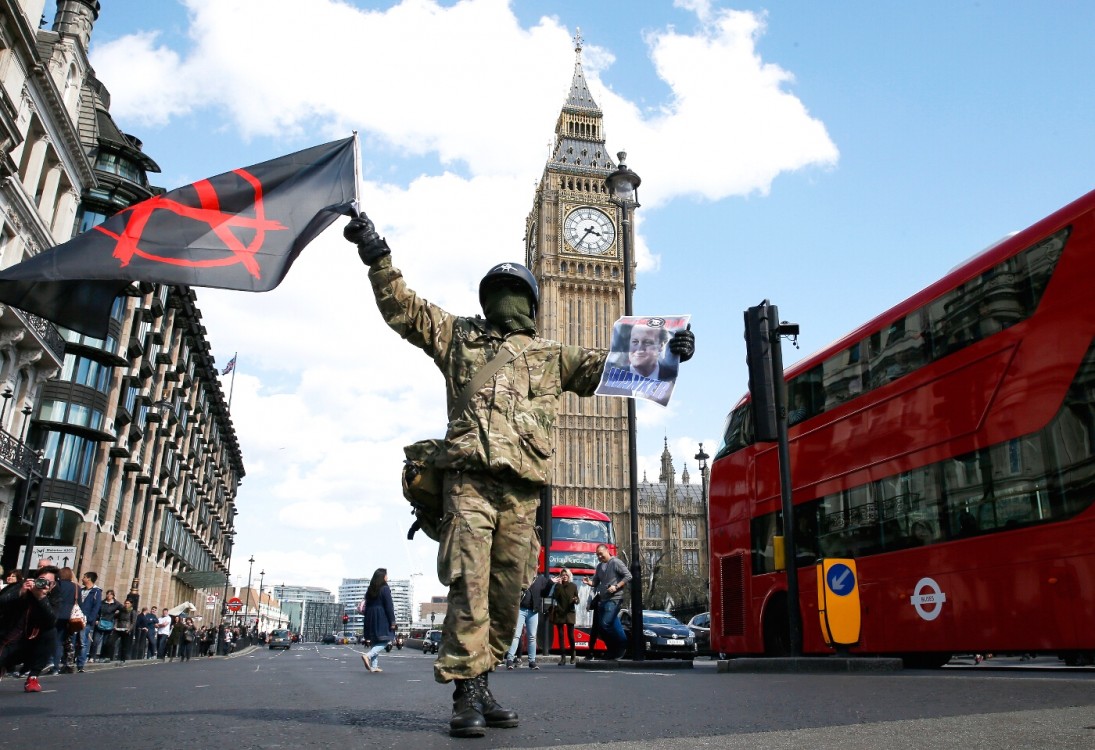
On the morning of Friday, May 8, the people of Great Britain awoke to the news that the Conservative party had won the general election by an unexpected majority – and within hours of the decisive Tory win, protest, anguish and antipathy began to surface.
Now, as election resentment gathers speed in the U.K., reinvigorated protest efforts are beginning to emerge as well, as demonstrators, campaigners and workers’ movements prepare step up efforts curbing the tough new policies proposed by the Tories – who for the last five years have been committed to relentless welfare cuts, and now have full control of the nation.
In the immediate wake of the results, anti-austerity protestors gathered on Downing Street, the home of the re-elected Prime Minister David Cameron, where they staged a demonstration chanting “get the Tories out.”
Another protest had been planned on Downing Street, which was to be attended by thousands of protestors if the Conservatives had not won a majority in the election. That march would have been dedicated to expel the Prime Minister amid claims that the Conservatives were planning to “occupy Downing Street.”
But in the wake of the shock majority victory, the protest was cancelled.
Now, anti-austerity protest groups have announced on Facebook they will be refocusing their energy “to get the biggest possible national demonstration on Saturday 20 June.”
On May 27, a separate protest took place in London – the day of the state opening in Parliament, when the Conservatives will officially form a government.
Given that more than 5,000 people attended a recent demonstration under the banner of "Fight Austerity, Fight the Tories – March on the State Opening of Parliament," the May 27 protest was expected to be widely attended.
The "Fight Austerity" group’s angst is centered on a number of policies. As the group writes:
“The new government is going to try to: smash the welfare state by £12 billion, privatize the NHS, raise tuition fees, decimate local services, make strike action illegal, scapegoat migrants, worsen the housing crisis and to crush all dissent that stands in their way.”
A Trade Union Movement
Meanwhile, a battle is looming between the government and the unions. Less than a week into the Conservative win, Britain's trade unions announced their first nationwide rail strike since John Major was prime minister 20 years ago.
The announcement came after the Conservatives said they would go ahead with plans to ban strikes unless 40% of people vote in favor of industrial action in the government’s first Queen’s Speech.
David Cameron, who says he is “determined to make changes,” has made his plans clear that the government will also require strike turnout to reach at least 50% of those entitled to vote for a strike to go ahead.
Steve Turner, assistant general secretary of the British trade union Unite, referred to the government’s tougher plans for union strikes as a “divisive face of Conservatism” that has not taken long to reveal itself. “It’s a terrible shame and a big mistake that one of the Government’s first acts is to attempt to reduce rights for working people that even past Tory administrations have upheld,” he said.
The demonstrations gathering in Britain reveal the potency of the anger much of the nation feels towards the Conservatives’ ideologies of harsh cuts and attempts to curb dissent.
As Penny Mercer, a teacher and mother of three, told Occupy.com: “As a teacher, mother and daughter, I’m terrified about the country’s future. The NHS looks sure to be privatized, which means we will move to a society where the rich prosper and the poor are left with ill health and with no help.”
“The future of education will put us behind all other Western countries as the government seem to think children should not be allowed to grow up at their own rate and seems hell bent on stealing their childhood from them," she continued. "As a teacher I know I will burn out far before the retirement age and most teachers will either leave the profession or risk not seeing any sort of retirement. I brought three children into the world and now I worry a lot for their futures as I can’t see a bright one in this country."
Britain’s Burgeoning Wealth Gap
Penny Mercer’s concerns are far from isolated. Much of the resentment felt in Britain stems from the burgeoning wealth gap that Britain has endured under the Tory-led government.
Since the recession that began in 2008, billionaires in Britain have seen their net worth double. As the 1,000 richest families now control a total of £547 billion and have more money than the poorest 40% of U.K. households, thousands are flocking to food banks, unable to feed themselves or their families.
Even as the Tories persist in talking about how Britain’s economy has been restored, a report by the Institute for Fiscal Studies says average household incomes have only barely recovered from the credit crunch and remain no better off than in 2008.
“Inequality at this scale is hugely damaging for society. Multiple studies show that living in a more unequal country means you’re more likely to have poorer education, suffer from poor mental health, trust people less, be victim of violent crime and even die earlier,” the report read.
People Coming Together
But Anna Maria, 32, who was planning to attend the "Fight Austerity, Fight the Tories" March on May 27, noted a positive point of the Conservative win. Referring to a nightclub in Manchester that is accepting food donations for the poor as a fee, Anna Maria said:
“One thing about the Tories getting in means people are coming together to look out for each in more ways than ever before. Nightclubs accepting food donations for the poor as payment – great idea.”
During 2014, more than 900,000 people in Britain relied on food banks to survive. In response to the rise in food banks, Antwerp Mansion, an underground nightclub in Manchester, put on a "Food for Thought" event. Instead of paying to get into the club with money, attendees must pay an admission fee in food donations for the many food banks around the city.
With a string of anti-austerity protests lined up in the forthcoming weeks, the trade union at loggerheads with the government, and nightclubs relinquishing sterling as payment in favor of food donations to feed the poor, a new dawn of dissent – and inspired alliances – is emerging in Britain as the nation prepares to mobilize against the face of renewed Conservative power.
3 WAYS TO SHOW YOUR SUPPORT
- Log in to post comments












